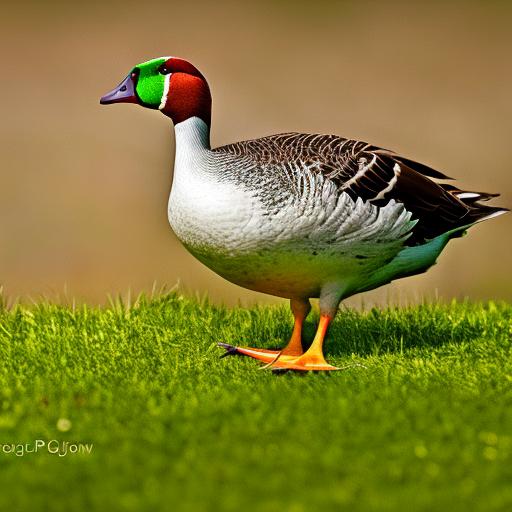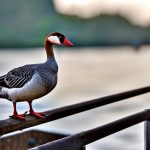Introduction to geese and their impact on grass:
Geese are a common sight in many areas, especially near bodies of water such as lakes, ponds, and rivers. These large waterfowl are known for their distinctive honking sound and their graceful flight patterns. However, while geese may be beautiful to look at, they can also cause significant damage to grass and other vegetation.
Geese are herbivores and graze on grass, plants, and other vegetation. They have a voracious appetite and can consume large amounts of grass in a short period of time. This can be problematic for homeowners, golf courses, parks, and other areas with extensive grassy areas.
When geese graze on grass, they can leave behind bare patches of soil and uproot plants. This can lead to erosion and soil compaction, making it difficult for new grass to grow. Additionally, their droppings can create unsightly messes and pose health risks due to the bacteria they carry.
Understanding the behavior of geese:
To effectively control geese and prevent them from damaging grass, it is important to understand their behavior. Geese are attracted to certain areas for several reasons. One of the main factors is the availability of food. Geese prefer areas with abundant grass and vegetation that they can graze on.
Geese also prefer areas near water, as it provides them with a sense of security. They feel safer near water because it allows them to escape from predators more easily. Additionally, water provides them with a source of food, such as aquatic plants and insects.
Geese are social animals and communicate with each other through various vocalizations and body language. They form strong bonds with their mates and offspring and often travel in large flocks. When one goose detects a potential threat, it will alert the rest of the flock by honking loudly.
Physical barriers to keep geese off grass:
One effective way to prevent geese from damaging grass is by installing physical barriers. There are several types of barriers that can be used, including fences and netting.
Fences can be made from a variety of materials, such as wood, metal, or plastic. They should be at least three feet high to prevent geese from easily crossing over. It is also important to bury the bottom of the fence at least six inches deep to prevent geese from digging underneath.
Netting can be used to cover grassy areas and prevent geese from accessing them. The netting should be secured tightly to the ground to prevent geese from getting underneath. It is important to regularly inspect and maintain the netting to ensure its effectiveness.
While physical barriers can be effective in keeping geese off grass, they do have some drawbacks. They can be expensive to install and maintain, especially for large areas. Additionally, they may not be aesthetically pleasing and can detract from the overall appearance of the landscape.
Repellents and deterrents for geese:
Another option for controlling geese is to use repellents and deterrents. There are several types available, including sprays and noisemakers.
Sprays can be applied to grass and vegetation to make them less appealing to geese. These sprays often contain natural ingredients that are safe for both humans and animals. They create an unpleasant taste or smell that deters geese from grazing.
Noisemakers, such as sirens or whistles, can also be effective in deterring geese. These devices emit loud noises that startle geese and make them uncomfortable. However, it is important to note that these devices may also disturb humans and other animals in the area.
While repellents and deterrents can be effective in keeping geese away from grassy areas, they may need to be reapplied regularly to maintain their effectiveness. Additionally, some geese may become accustomed to the repellents or noisemakers over time and may not be deterred by them.
Scare tactics to keep geese away:
Scare tactics can also be used to keep geese away from grassy areas. One common scare tactic is the use of decoys, such as plastic owls or coyotes. These decoys mimic natural predators and can frighten geese away.
Another scare tactic is the use of predator calls. These calls imitate the sounds of natural predators, such as foxes or hawks. When geese hear these calls, they may become frightened and fly away.
While scare tactics can be effective in the short term, they may lose their effectiveness over time as geese become accustomed to them. Additionally, some scare tactics may not be suitable for residential areas or areas with a lot of human activity.
Landscaping solutions to discourage geese:
Certain landscaping techniques can be used to discourage geese from grazing on grassy areas. One option is to plant certain types of vegetation that geese find unappealing. For example, geese do not like plants with prickly leaves or strong odors.
Another option is to create barriers using rocks or other landscaping materials. These barriers can make it difficult for geese to access grassy areas and can deter them from grazing.
Additionally, creating uneven terrain or adding obstacles, such as large rocks or logs, can make it more difficult for geese to walk on grassy areas. This can discourage them from grazing and force them to seek out alternative food sources.
Creating alternative habitats for geese:
One approach to controlling geese is to create alternative habitats for them. This can be done by creating ponds or wetlands in areas away from grassy areas. By providing geese with an alternative habitat, they may be less likely to graze on grass.
Creating ponds or wetlands can also provide other benefits, such as attracting other wildlife and improving the overall biodiversity of an area. However, it is important to consider the potential impact on the local ecosystem before implementing this approach.
Educating the public on feeding geese:
Feeding geese can be harmful and can contribute to their overpopulation in certain areas. When geese are fed by humans, they become dependent on this food source and may lose their natural foraging instincts. This can lead to an overreliance on human-provided food and can cause health problems for the geese.
To address this issue, it is important to educate the public on the negative impacts of feeding geese. This can be done through signage, educational programs, and community outreach. By raising awareness about the harmful effects of feeding geese, it is possible to reduce the number of geese in certain areas.
Proper lawn maintenance to prevent geese from grazing:
Proper lawn maintenance can also help prevent geese from grazing on grassy areas. Regular mowing can keep grass short and less appealing to geese. Additionally, fertilizing and watering grass can promote healthy growth and make it more resistant to grazing.
It is also important to remove any fallen leaves or debris from grassy areas, as these can provide a food source for geese. By keeping grassy areas clean and free of debris, it is possible to discourage geese from grazing.
Seeking professional help for geese control:
In some cases, it may be necessary to seek professional help for geese control. There are several types of professional services available, including wildlife management companies and pest control companies.
These professionals have experience in dealing with geese and can provide effective solutions for controlling them. They may use a combination of physical barriers, repellents, scare tactics, and other strategies to keep geese away from grassy areas.
Controlling geese and preventing them from damaging grass and other vegetation requires a multi-faceted approach. By understanding the behavior of geese and implementing a combination of physical barriers, repellents, scare tactics, landscaping techniques, and proper lawn maintenance, it is possible to effectively manage geese populations and protect grassy areas. Additionally, educating the public on the negative impacts of feeding geese can help reduce their overpopulation in certain areas. If all else fails, seeking professional help can provide additional support and expertise in geese control.
If you’re looking for ways to keep geese off your grass, you might also be interested in learning about how to create the perfect chicken coop. Poultry Wizard has a helpful article on “10 Essential Features for a Functional Chicken Coop” that provides valuable insights on designing a coop that meets the needs of your feathered friends. From ventilation and lighting to nesting boxes and predator protection, this article covers all the essential elements for a successful chicken coop. Check it out here for some expert advice on creating a safe and comfortable home for your chickens.
FAQs
What are the common problems caused by geese on grass?
Geese can cause damage to grass by overgrazing, leaving droppings that can kill the grass, and creating unsightly bare patches on the lawn.
What are some effective ways to keep geese off grass?
Some effective ways to keep geese off grass include using physical barriers such as fences or netting, using decoys or scare tactics, and applying repellents or deterrents.
What are some natural repellents that can be used to keep geese off grass?
Some natural repellents that can be used to keep geese off grass include planting certain types of vegetation that geese do not like, using predator urine or eggshells, and using reflective tape or shiny objects.
What are some humane ways to keep geese off grass?
Some humane ways to keep geese off grass include using noise-making devices, using motion-activated sprinklers, and using trained dogs to chase away geese.
What are some long-term solutions to keep geese off grass?
Some long-term solutions to keep geese off grass include modifying the landscape to make it less attractive to geese, using habitat management techniques to discourage geese from nesting in the area, and implementing community-wide geese management programs.
Meet Walter, the feathered-friend fanatic of Florida! Nestled in the sunshine state, Walter struts through life with his feathered companions, clucking his way to happiness. With a coop that’s fancier than a five-star hotel, he’s the Don Juan of the chicken world. When he’s not teaching his hens to do the cha-cha, you’ll find him in a heated debate with his prized rooster, Sir Clucks-a-Lot. Walter’s poultry passion is no yolk; he’s the sunny-side-up guy you never knew you needed in your flock of friends!







